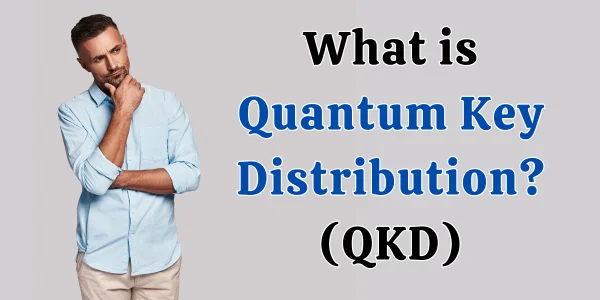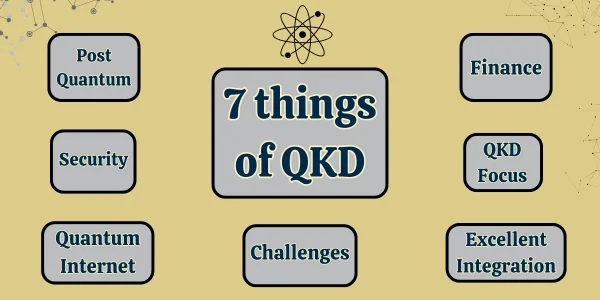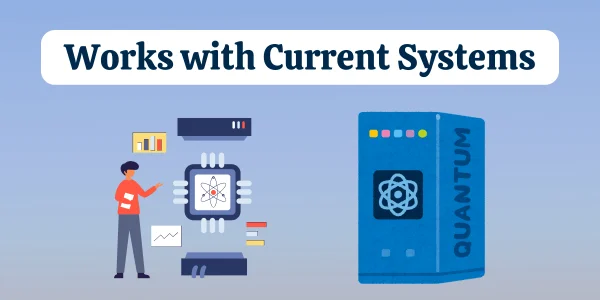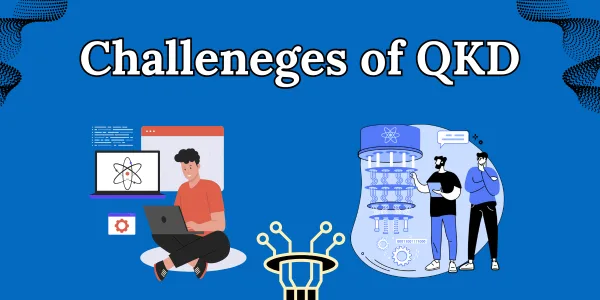7 Things You Need to Know about Quantum Key Distribution
Imagine you have a secret message to share with a friend, and you don’t want anyone else to see it.
Quantum Key Distribution (QKD) is like a super-safe way to keep that message secret. It uses tiny particles called quantum bits, or qubits, to send the key that locks and unlocks the message. This makes sure that only you and your friend can understand the message, even if someone tries to listen in.
Let’s learn more about how this magical science works!
What is Quantum Key Distribution?

Quantum Key Distribution is a method of sending secret information securely. It uses the strange and wonderful rules of quantum physics. These rules say that if anyone tries to spy on the secret, the message will change, and you will know that someone is watching! This makes QKD one of the safest ways to share information.
How Does Quantum Key Distribution Work?
Guys, here is how the QKD works:
- Creating the Key: A key is like a special code made up of 1s and 0s. QKD creates this code using qubits.
- Sending the Key: The qubits are sent from one person to another using light. This can be through a fiber-optic cable or even through the air!
- Checking for Spies: If someone tries to steal the qubits while they are traveling, the quantum rules will change the qubits. This way, you’ll know if anyone is trying to spy on you.
- Using the Key: Once you know the key is safe, you can use it to lock and unlock your secret messages.
But, guys, if you want to know how does quantum key distribution work, it might be better for you to talk to an expert. They can guide you through the entire thing without any issues or confusion.
Types of Quantum Key Distribution
Guys, there are four main types of QKD:
- BB84 Protocol: This was the first QKD method ever invented. It uses photons (tiny particles of light) to send the key.
- E91 Protocol: This method uses something called quantum entanglement, where two particles are connected in a magical way, no matter how far apart they are.
- Continuous-Variable QKD: Instead of single photons, this method uses a stream of light to send information.
- Measurement-Device-Independent QKD: This is a newer and even safer type that protects against any weaknesses in the devices used.
7 Essential Aspects of Quantum Key Distribution (QKD)
After understanding how Quantum Key Distribution (QKD) works and the various types it includes, it's critical to remember the following key aspects that influence its effectiveness and limitations.

- Better Security, But Not Perfect
- Improves Key Sharing
- Overcomes Distance Barriers
- Works with Current Systems
- Investment for the Future
- Better Than Conventional Encryption
- Challenges to Overcome
These key points highlight QKD's strengths and challenges, offering a more in-depth understanding of how this technology affects the world of secure communication.
Let's look at these aspects to see how QKD is both a powerful tool and one that is still facing challenges as it grows.
1. Better Security, But Not Perfect
QKD stands out for its remarkable security features. Unlike traditional cryptographic methods, which are susceptible to potential cracking with sufficient computational resources and time, QKD offers an unparalleled level of security. Its strength lies in its ability to detect any attempt at eavesdropping. This is achieved by disrupting quantum states, effectively alerting both the sender and receiver to any breach in the communication channel.
- Unparalleled Security: Detects any attempt at eavesdropping.
- Quantum State Disruption: Alerts the sender and receiver if data is compromised.
- Greater Protection: Offers a level of security traditional encryption methods cannot.
2: Improves Key Sharing
Traditional cryptographic methods face the daunting task of securely sharing encryption keys between communicating entities.
Quantum Key Distribution (QKD) revolutionizes this process by facilitating the direct transfer of quantum keys encoded within the unique properties of individual photons.
This breakthrough ensures great security, as even in the face of highly sophisticated adversaries, the integrity of the keys remains intact, thereby safeguarding data with the utmost confidentiality.
- Direct Transfer of Keys: Secure communication without the need for third parties.
- Photon-Based Keys: Quantum keys are securely encoded in individual photons.
- Impenetrable Integrity: Ensures the integrity of keys, safeguarding data against threats.
3: Overcomes Distance Barriers
Breakthroughs in quantum technology have shattered the geographical barriers that once limited traditional communication methods.
With advancements such as quantum repeaters and satellite-based systems, QKD can now span vast distances, revolutionizing global cybersecurity by offering secure communication channels unbound by conventional constraints.
- Quantum Repeaters: Enhance long-distance QKD communication.
- Satellite Systems: Extend the reach of secure communication.
- Global Coverage: Overcomes the limitations of traditional communication methods.
4: Works with Current Systems
While Quantum Key Distribution (QKD) offers promising advancements in security, its effective implementation relies on integration with established communication networks and protocols.

Initiatives are actively pursuing hybrid approaches, amalgamating QKD's security benefits with the adaptable nature of classical encryption.
This synergy ensures compatibility across a spectrum of applications and systems, maximizing QKD's utility and reach.
- Hybrid Approaches: Combines QKD with existing encryption methods.
- Seamless Integration: Works well with established systems.
- Versatility Across Applications: Maximizes QKD's utility across different platforms.
5: Investment for the Future
The rapid progress in quantum tech is opening exciting prospects for Quantum Key Distribution (QKD). This encryption method usually holds immense potential offering secure communication networks and laying the groundwork for a quantum internet.
With researchers and industry pioneers delving into innovative strategies, we're on the brink of a future where quantum mechanics redefine security, fostering a more interconnected and resilient world.
- Quantum Internet: Laying the foundation for a secure quantum network.
- Future-Proofing Security: Positioning QKD as a key component in next-gen communication systems.
- Ongoing Innovation: Continuous research driving QKD advancements.
6: Better than Conventional Encryption
Picture this: Imagine we have this super cool way of keeping secrets called Quantum Key Distribution (QKD). It's like the superhero of encryption because it uses the mind-bending rules of quantum physics to lock down our messages.
Instead of relying on tricky math like regular encryption, QKD taps into the mysterious behavior of tiny particles called photons to keep our communication super secure.
- Quantum Physics Backing: Uses quantum mechanics for enhanced security.
- Unbreakable Security: Secure communications protected by the laws of physics.
- No Cracking: More reliable than traditional encryption techniques.
And the best part? It's rock-solid and secure, thanks to the unbreakable laws of physics backing it up. So, if you want to keep your chats on lockdown, QKD is the way to go!
7: Challenges to Overcome
QKD has a ton of promise, but it's not all smooth sailing just yet.
Getting QKD systems up and running involves using high-tech gear and making sure those quantum states are spot on, which can be tricky and expensive.

Plus, stuff like noise and signal loss from the environment can mess with the performance of the quantum channels, so researchers are still figuring out ways to tackle these challenges.
- Cost and Complexity: High-tech gear and systems required for QKD.
- Environmental Interference: Noise and signal loss can affect performance.
- Ongoing Research: Solutions to these challenges are still being explored.
In Conclusion
So, here's the deal.
Quantum Key Distribution is like the superhero of cryptography. It's changing the game, giving us crazy levels of security, and opening doors to a whole new world of safe communication.
Sure, there are still hurdles to jump, but the payoff? Huge!
We're talking about a future where keeping your stuff private online isn't a dream; it's the norm. So, strap in and get ready to surf the wave into a future where your data's as safe as can be!
Do you want to Learn SEO, Blogging, Freelancing, & WordPress Free of Cost?
If YES! Then follow us on YouTube & Facebook.
- YouTube: https://youtube.com/@LearnWithGA
- Facebook: https://www.facebook.com/groups/learn.with.GA
- ✔ Be Respectful
- ✔ Stay Relevant
- ✔ Stay Positive
- ✔ True Feedback
- ✔ Encourage Discussion
- ❌ Avoid Spamming
- ❌ No Fake News
- ❌ Don't Copy-Paste
- ❌ No Personal Attacks


